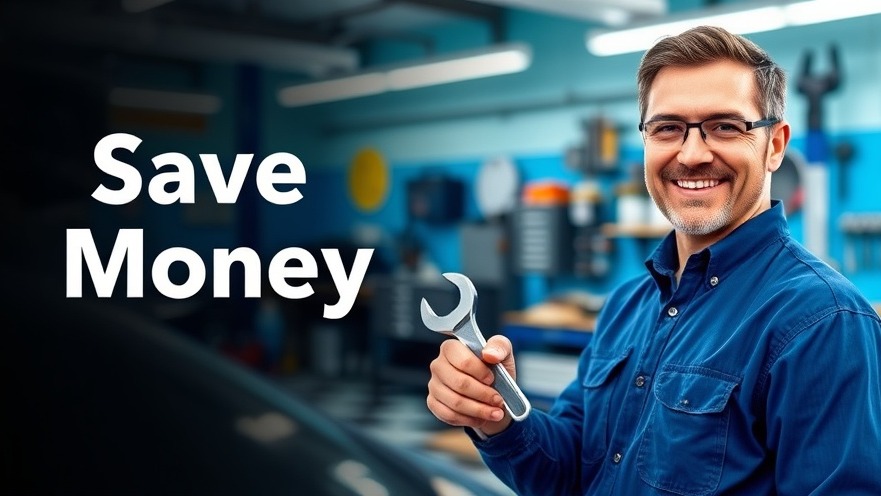
Save Money by Tuning into Car Care Secrets
Car maintenance can feel overwhelming, but savvy automobile owners can save substantial money with a few easy practices. In today's world, where every penny counts, learning effective maintenance tips can help keep your car running smoothly and prevent costly repairs. By mastering just a few essential tricks, you can potentially save over $2,700 every year on car repairs.
In '14 Car Repair Secrets That Will Save You Over $2,700 Every Year,' the discussion dives into essential car maintenance tips, exploring key insights that sparked deeper analysis on our end.
The Importance of Spark Plug Maintenance
One of the simplest yet most effective maintenance measures is paying attention to your spark plugs. Bad spark plugs can lead to rough idling and poor fuel economy, and replacing them is a much cheaper fix than paying for major engine repairs, which can start at $4,000 or more. For less than $10 per plug, you can safeguard your engine from unnecessary struggles. Make it a habit to check and replace your spark plugs every 30,000 miles or according to your car's manual.
The Cost of Skipping Oil Changes
Many drivers believe that skipping an oil change is a way to save money, but this is a misconception. Old oil can lead to significant engine damage, costing thousands to fix. Regular oil changes, which cost around $75 to $90, are a small investment for maintaining your vehicle's health. Keeping up with your oil changes every 5,000 miles not only extends the life of your engine but also promotes better fuel efficiency.
Check Your Battery Terminals Regularly
Battery maintenance often goes unnoticed until it’s too late. Corrosion on battery terminals may seem minor but can stop your car from starting completely. With the simple use of a $5 wire brush, you can eliminate corrosion. Regularly testing your battery and keeping terminals clean can help you avoid a costly $250 replacement. Make it a habit to check your battery twice a year!
Monitor Brake Pad Wear and Tear
Every automobile owner should heed any unusual noises when braking. If you hear squeaking, your brake pads may be thin and need replacing. Ignoring this warning can lead to unsafe driving conditions and cost up to $300 per axle for new pads. As a preventive measure, checking brake fluid every time you get an oil change can help keep your brake system in check.
Keep an Eye on Your Suspension
A smooth ride relies on functioning suspension components. Ignoring worn shocks or struts can lead to costly repairs. It’s essential to inspect your suspension system every 15,000 to 30,000 miles to avoid further issues and keep your drive as comfortable as possible.
Don’t Underestimate Wiper Blades
While wiper blades may seem insignificant, clear visibility is vital for safety. If your windshield wipers leave streaks or are ineffective, they need replacement. Prioritize your safety by checking your wipers at the start of each season, and replace them if necessary.
Questioning Unnecessary Services: The Coolant Flush Dilemma
Many garages suggest coolant flushes, often unnecessarily. Modern coolants can last beyond 50,000 miles, making it prudent to check your owner’s manual first. If the coolant is clean and your engine isn’t overheating, skipping this flush can save you around $150.
Be Prepared: Check Your Spare Tire
The spare tire can be a lifesaver, but it often goes unheeded until needed. A flat spare can lead to stressful situations. A quick air pressure check can take just minutes. Make it routine to check all tires, including the spare, once a month.
Belt and Hose Inspections
Belts and hoses are crucial for engine functionality. Neglecting to check them can lead to overheating or major breakdowns. Replacing your timing belt every 60,000 miles and your serpentine belt every 40,000 miles protects your engine.
Monitor Lights for Safety Compliance
Working lights are essential for safe driving; they ensure you are visible to other drivers. Regularly checking your headlights, brake lights, and turn signals can save you from fines and even insurance hikes.
Stay Emission Compliant
In many areas, passing an emissions inspection is required. Keeping your car in good shape can help avoid fines and complications. Schedule inspections according to your local regulations for peace of mind.
The Costs of Neglecting the Parking Brake
Using the parking brake, even on flat ground, prevents transmission damage, which can cost thousands to repair. It’s quick to engage and can save you from major repair bills down the road.
Replacing the Cabin Air Filter
Finally, don’t forget about your cabin air filter. It keeps air clean inside your car and the AC system functioning properly. If clogged, it could lead to costly repairs down the line. Check your filter every year to maintain a healthy driving environment.
Incorporating these simple car maintenance tips can significantly cut down on repair costs. Staying informed and performing these basic tasks can save your wallet while keeping your vehicle safe and reliable.
 Add Row
Add Row  Add
Add 




Write A Comment